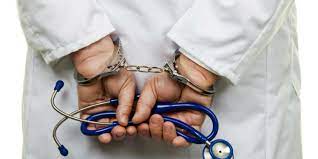Tackle medical quackery now
The damage medical quackery has done to the lives of many individuals in our society is immeasurable. This ranges from deformities, incapacitation, to life-threatening conditions to outright cases of death. Medical quackery is when an individual, without the necessary qualification and certification, claims to be a medical professional and treats patients, mostly for money. According […]

The damage medical quackery has done to the lives of many individuals in our society is immeasurable. This ranges from deformities, incapacitation, to life-threatening conditions to outright cases of death. Medical quackery is when an individual, without the necessary qualification and certification, claims to be a medical professional and treats patients, mostly for money.
According to a report by the World Health Organisation (WHO) on countries that are at high risk of quackery, Nigeria is one of the most vulnerable on the list which includes India, Pakistan, Kenya, Ghana and Tanzania.
The practice is so rampant in Nigeria due to some gaps in the health sector. These include lack of professionals and adequate medical personnel, cultural beliefs and abject poverty in the country. The lack of proper monitoring and stringent regulations are also some of the major issues that allow quacks to operate and even be patronised by people.
In the words of the president, Nigerian Medical Association, Uche Rowland, Nigeria had only 24,000 licensed medical doctors available for a population of more than 200 million people as of October 2022. This is less than 10 per cent of the number needed to meet the WHO recommendation.
Dr Biodun Ogungbo, a brain and spine specialist, notes that “Patients go to chemists to avoid paying for consultations. They feel that the prescribed drugs are often like what the chemists sell to them anyway. These quacks understand the local economy, and the purse of the client and they may also take goods for barter. They are cheap and sometimes treatment is given on credit. They forget it might cost more in the long run as you end up losing your life.”
Tellingly, there are no records of the number of quacks practising as doctors in the country. Even the Medical and Dental Council of Nigeria does not have such information. But in Kano alone, the chairman of Tudun Wada Local Government Council in Kano State, Alhaji Ahmad Tijjani, said a task force committee he set up discovered 130 hospitals and pharmacies allegedly being operated by quack doctors. The committee alleged that some of the hospitals were manned by holders of Senior Secondary School certificates.
The chairman of the committee, Alhaji Abubakar Karafe, also said they found an electrical engineer among the quack doctors, who was operating a private hospital and attending to patients. “He was prescribing drugs, administering drips, blood and even attending to pregnant women. One of the quack doctors had transfused unscreened HIV-positive blood to a woman who was seeking treatment for malaria,” Daily Trust reported quoted Karafe as saying.
So many ugly stories abound in the country about the activities and the damage being perpetrated by these evil individuals. Recently, one Noah Kekere, a suspected quack doctor, was arrested after he was accused of harvesting a woman’s kidney during a surgery in Jos, Plateau State. In Kano, one Hajiya Bilkisu contracted an infection that led to severe heart enlargement because surgery was carried out on her without thorough medical examination of her medical history and other underlying ailments by a quack doctor.
To arrest these ugly trends, many reforms must be taken to make our laws stringent against medical quackery, as some of the laws are obsolete. For example, Nigeria’s laws frown at medical quackery and prescribe punishment for anyone posing as a medical doctor to endanger the lives of citizens. Section 17 (1a and b) and (5a &b) of the Medical and Dental Practitioners Act, Cap. M8 LFN 2004, prescribes punishments in fines between N5,000 and N10,000 or imprisonment not exceeding five years against the practice of quackery and other related offences, including using the title of physician, surgeon or doctor.
This section has to be updated. A portal and a database should be maintained and updated by the council so that people can check the status of whoever claims to be a medical professional. If this is done, quacks can easily be fished out.
The sector must be fully funded in conformity with the “ABUJA DECLARATION” where African Union member states met in Abuja, Nigeria, in April 2001 and committed to allocating 15% of their government budgets to health which we have not met up as only 5.75 per cent of the total budget was allocated to the health sector in the 2023 proposed budget (N1.17 trillion).
The issue of brain drain in the health sector should also be looked into. As Mr Rowland said, a large number of Nigerian doctors emigrated to seek greener pastures in developed countries, noting that 5,600 of them have migrated to the United Kingdom (UK) in the last eight years. He said the country requires a mix of 23 doctors, nurses and midwives per 10,000 population to deliver essential health services, according to the WHO.
A massive sensitization exercise should also be undertaken, especially in the rural areas, to inform the people of the dangers of patronizing unqualified medical personnel.
